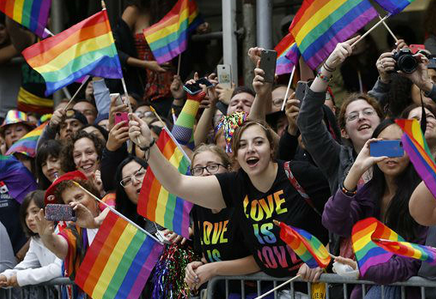
Source: AP Photo/Kathy Willens
By Dr. Becki Cohn-Vargas
Not In Our School Director
As the conversation about equality continues both in the U.S. and abroad, this blog series featuring just a few international LGBTQ voices provides inspiration for those fighting for progress.
In each of these personal stories, individuals have joined together to make political and cultural changes that would pave the way for access to services, greater safety, and a sense of belonging. Here are the personal narratives we have shared over the past weeks:
LGBTQ Lives and Rights: A Tiny Peek into the International Window
 Gay Pride is a powerful, community event that shines a light on the LGBTQ community. It just may be that this event has done more than any single event to raise awareness and build community for LGBTQ people and their allies. Not In Our School launched a blog series about LGBTQ histories and experiences in different countries in honor of the U.S. Supreme Court Decision and this year’s Pride Month.
Gay Pride is a powerful, community event that shines a light on the LGBTQ community. It just may be that this event has done more than any single event to raise awareness and build community for LGBTQ people and their allies. Not In Our School launched a blog series about LGBTQ histories and experiences in different countries in honor of the U.S. Supreme Court Decision and this year’s Pride Month.
Singapore’s Pink Dot: A Safe Space for the LGBTQ Community
One of the most unprecedented and positive manifestations of the hopes and energies of Singapore’s queer community is Pink Dot. Pink Dot is an annual carnival-like event held to recognize the LGBTQ+ community’s “freedom to love.” The event has repeatedly made history for being the largest public gatherings ever held at the Hong Lim Park.
36 Years of the LGBT Fight in México
In the last 36 years, the sexual diversity movement in Mexico has achieved significant advances that have made it possible for gay, lesbian, bisexual and trans (LGBT) citizens to gain access to some of the rights that historically had been denied to them. Those years of struggle were not a loss but a gain, since they helped to bring forces together in favor of LGBT issues. Years of work and progress made it possible to explain to a society with a strong macho and anti-gay heritage that sexual orientation or gender identity are not reasons to exclude people from their rights.
Dutch Tolerance, Revisited
 One of the main aspects of Dutch tolerance is that anyone can do what they want, as long as others are not bothered by it. Feeling "bothered" include any visibility of LGBT expressions that are not within the heterosexist norm of an individual. In the past decade, half a dozen researchers have published reports on the situation of Dutch LGBT people, using report titles that are playing with the word "normal" or "gewoon" ("common").
One of the main aspects of Dutch tolerance is that anyone can do what they want, as long as others are not bothered by it. Feeling "bothered" include any visibility of LGBT expressions that are not within the heterosexist norm of an individual. In the past decade, half a dozen researchers have published reports on the situation of Dutch LGBT people, using report titles that are playing with the word "normal" or "gewoon" ("common").
Scotland: LGBT Partnerships Being Recognized Internationally
My partner and I had a Civil Partnership this summer. We stood up in front of friends and family and made vows to each other, exchanged rings, had a Celtic handfasting, and signed on the dotted line to declare that we are joined in law as well as in spirit. Afterwards we ate, drank and danced with those closest to us, all coming together to celebrate our relationship. We were able to do so because of the Civil Partnership Act 2004.
The Right to Education and LGBT People: From Research to Action
 Although there remains a lot of discussion and resistance on the global level, the recognition that LGBT people do have human rights is on the rise. In the European Union, there is progress on employment rights, the recognition of same-sex marriage and even trans* rights. However, a notable laggard in this list is the right to education. Until three years ago, almost no diplomat on the global level dared to talk about LGBT rights in education.
Although there remains a lot of discussion and resistance on the global level, the recognition that LGBT people do have human rights is on the rise. In the European Union, there is progress on employment rights, the recognition of same-sex marriage and even trans* rights. However, a notable laggard in this list is the right to education. Until three years ago, almost no diplomat on the global level dared to talk about LGBT rights in education.
Thank you for joining us for this blog series. Our globalized world allows communities of support to come together via online technology to speak up while also standing up to hate crimes, unfair laws, and bigotry against the LGBTQ community in their own towns and in countries across the world. Just as Not In Our Town focuses on community actions for change, individuals and groups across the world are using many creative ways to get heard from marches and other visible actions, to international boycotts and petitions.
Together, we are working globally to shift cultural norms and to build a world of safety and inclusion for all people.
Add new comment